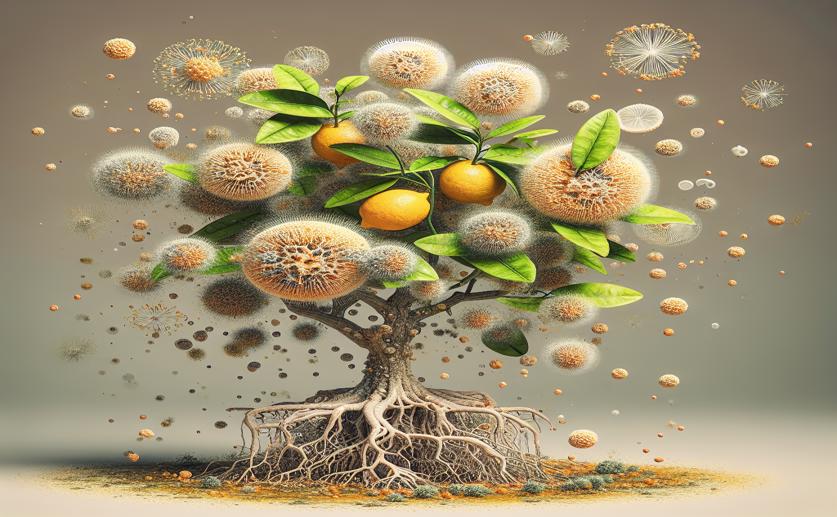Enhancing Fungus Spores to Fight Citrus Pest

Image Source: Natural Science News, 2024
Key Findings
- In Mexico, adding 5% palm kernel meal to rice boosts fungus spore production by 40%
- These enhanced spores killed 90% of a citrus pest, compared to 52% with regular spores
- Spores remained over 90% viable after 10 months, suggesting a good shelf life
In the ongoing battle against agricultural pests, scientists are constantly seeking innovative and environmentally friendly solutions. One such pest, Diaphorina citri, is a notorious carrier of bacteria that cause huanglongbing, a devastating disease in citrus plants. The traditional approach to managing this pest has involved the use of parasitoid wasps like Tamarixia radiata, which have been released in citrus groves to naturally suppress D. citri populations[2]. However, another promising avenue of pest control involves the use of entomopathogenic fungi—fungi that can infect and kill insects.
A recent study by researchers at the Universidad de la Cañada has made significant strides in this area, focusing on the fungus Cordyceps javanica[1]. This fungus produces spores, or conidia, that can infect and kill D. citri. The study aimed to enhance the production and effectiveness of these conidia by incorporating palm kernel meal (PKM) into the substrate used for growing the fungus.
Traditionally, solid-state fermentation systems using rice grains have been employed to grow entomopathogenic fungi like C. javanica, as well as other fungi like Metarhizium anisopliae and Cordyceps fumosorosea[3][4]. These fungi are then used to create biopesticides, which are natural alternatives to chemical pesticides. The recent study found that by adding just 5% PKM to the rice, the yield of C. javanica conidia increased by 40%, a significant improvement that suggests a more efficient production method for mycoinsecticides.
This finding is particularly important for the management of pests like D. citri, as the study also found that the conidia harvested from the rice/PKM mixture caused a 90% mortality rate in adult D. citri, compared to a 52% mortality rate from conidia grown on rice alone. This indicates not only an increase in quantity but also an enhancement in the quality and effectiveness of the conidia against the pest.
Moreover, the conidia's viability and hydrophobicity—a measure of how well the spores can attach to and penetrate the insect's body—were not compromised by the use of PKM. Viability was also maintained at high levels after 10 months of storage at 4°C, indicating that the conidia have a good shelf life and can be stored for medium-term use.
These findings are promising for several reasons. Firstly, they offer a potential solution to the problem of controlling D. citri without relying solely on parasitoid wasps or chemical pesticides[2]. Secondly, they demonstrate that the production of mycoinsecticides can be made more efficient and cost-effective, which is crucial for their adoption in agricultural practices. This aligns with previous studies that have emphasized the importance of optimizing fungal production systems to manage insect pests[3][4][5].
The study also has broader implications for the development of biopesticides. The use of PKM as a co-substrate could potentially be applied to the production of other entomopathogenic fungi, enhancing the sustainability and efficacy of biocontrol agents against a variety of agricultural pests. This could lead to a reduction in the use of harmful chemicals in farming, which is beneficial for the environment and human health.
In conclusion, the research conducted by the Universidad de la Cañada offers a compelling advancement in the field of biological pest control. By improving the production and potency of Cordyceps javanica conidia through the addition of palm kernel meal, this study provides a scalable, eco-friendly solution to combat the spread of pests like Diaphorina citri. It is a significant step forward in the quest for sustainable agriculture and the protection of our global citrus groves.
AgricultureBiotechMycology
References
Main Study
1) Improvement of the production and quality of Cordyceps javanica conidia for the control of Diaphorina citri adults.
Published 29th February, 2024
Journal: World journal of microbiology & biotechnology
Issue: Vol 40, Issue 4, Feb 2024
Related Studies
3) From the dual cyclone harvest performance of single conidium powder to the effect of Metarhizium anisopliae on the management of Thaumastocoris peregrinus (Hemiptera: Thaumastocoridae).
https://doi.org/10.1371/journal.pone.0283543
Related Articles





 9th February, 2024 | Jim Crocker
9th February, 2024 | Jim Crocker